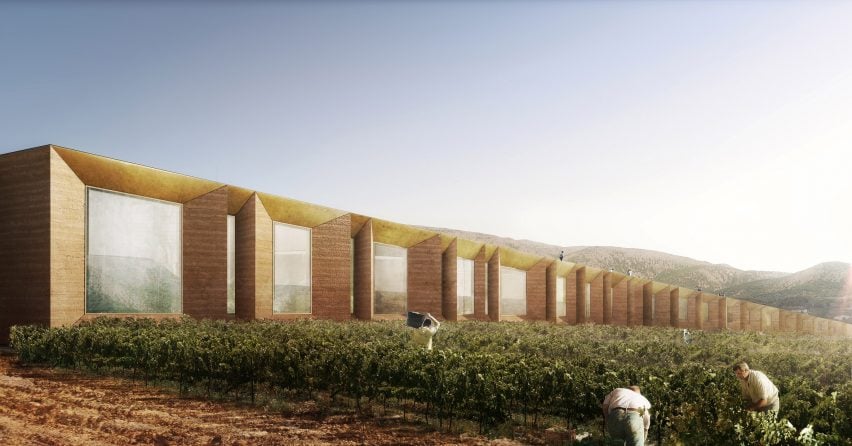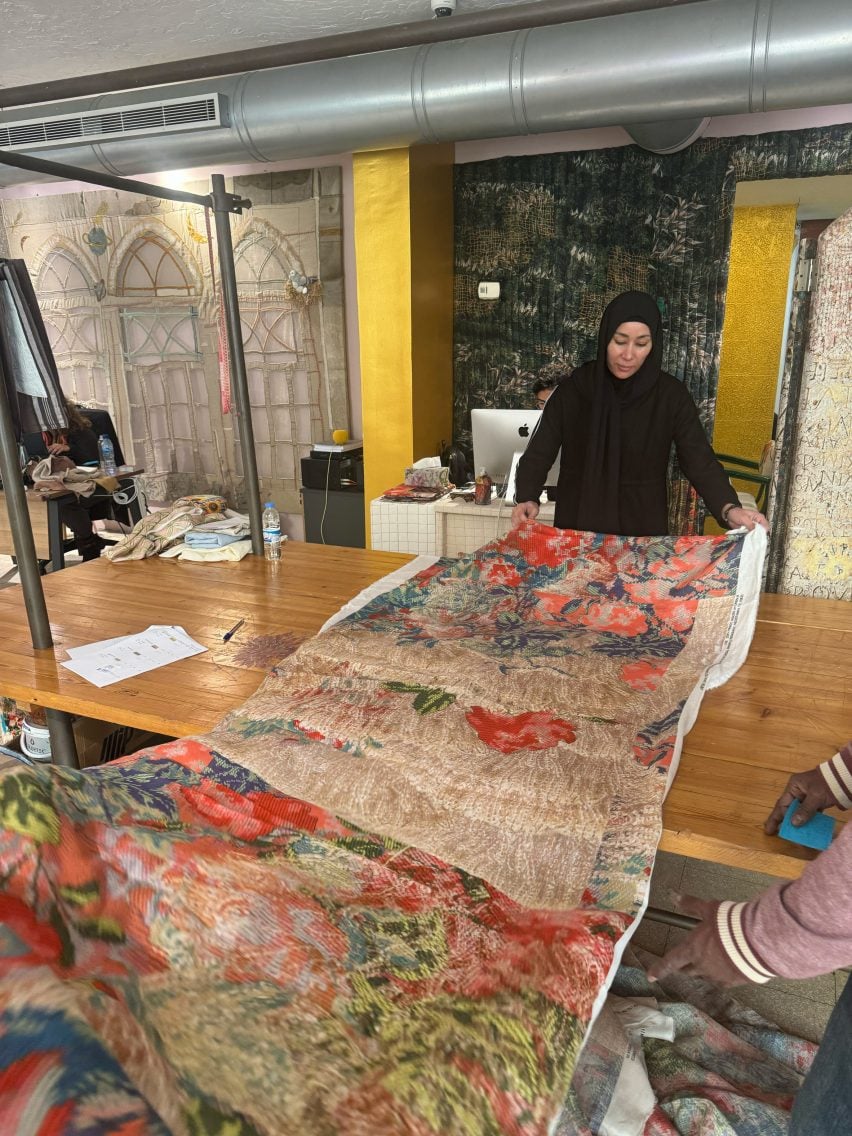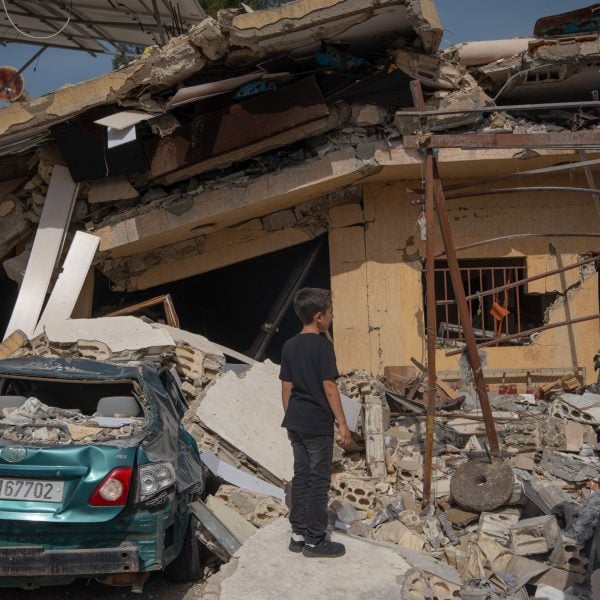Amid a fragile ceasefire, architects and designers in Lebanon are torn between hope and fear as they take stock of how Israel’s military campaign has impacted their country’s creative community.
The last year of conflict has seen Lebanon face its most intense attacks in several decades, with Israeli strikes killing more than 4,000 people – among them 316 children – and displacing 1.3 million more.
“So many designers have moved abroad,” interior designer Nour Saccal, of Saccal Design House, told Dezeen. “And I am not sure if they will indeed return.”
“Many have started looking into opening offices outside Lebanon in order to ensure a continuous workflow and protect themselves from any future instability.”
“Culture is the first thing that gets affected”
As designers and craftspeople fled the violence, many Lebanese studios were forced to pause or delay projects.
Now, they fear demand for their work might not return until there is some semblance of stability – a prospect that still seems far off as both Israel and Lebanese militant political group Hezbollah continue to violate the ceasefire they agreed on 27 November.
“Culture is the first thing that gets affected when events like this happen,” said architect Lina Ghotmeh. “Who’s going to build a museum when everybody’s bombarding everywhere?”
“But culture is very important because culture is what brings people together,” she added. “Cultural places are ones where people can be confronted with different points of view. So it’s essential, it’s not a luxury.”
In fact, Lebanon’s celebrated creative industries are needed now more than ever, argues We Design Beirut founder Mariana Wehbe, as the nation looks to rise from the ashes of the war and elect a new president after two years without a head of state and a parliament in deadlock.
“While we’ve rebuilt physically many times, rebuilding fundamentally as one united people is a challenge we have yet to fully undertake,” Wehbe explained. “For the first time in our history, we have an opportunity to turn the page, to forgive and to come together to build a unified nation.”
“What I believe has always bonded us together as a country is the creative community – it’s an integral part of our moving forward,” she added. “It is the only community far from politics, polarisation and finger-pointing, breaking all barriers of religion and political stands.”
“Lebanon has never been without its conflicts”
Lebanon and Israel have been embroiled in an on-and-off conflict since the latter was founded in 1948. But the most recent clash erupted when Hezbollah fired on Israel after the country was attacked by Palestinian group Hamas on October 7, 2023, triggering a year of tit-for-tat airstrikes.
Israel escalated the conflict into an all-out war and ground invasion in September, which it claims to be targeted at Hezbollah militants but has resulted in many civilian deaths, leading human rights organisations to call for Israel to be investigated for potential war crimes.
More than 500 people died on a single day that month, making it “the bloodiest day in Lebanon” since the country’s civil war in 1990, according to UN secretary general António Guterres.
The conflict – which saw Beirut heavily bombed until seconds before the ceasefire came into effect – has also caused an estimated £6.7 billion worth of damage, with more than 100,000 homes either hit or entirely levelled.
This destruction could not have come at a worse time for Lebanon, already battered by economic collapse, severe food shortages, the Covid-19 pandemic and a disastrous explosion in the capital’s port in a span of only five years.
Even before Israel’s invasion, this amounted to “the most devastating, multi-pronged crisis in its modern history”, according to the World Bank, with the country losing “the equivalent of 15 years of economic growth“.
“Lebanon has never been without its conflicts: the 15-year civil war, the Israeli invasion of 1982, the Israeli aggression of 2006, the Beirut Port explosion of 2020, and now this invasion that is above and beyond anything we have ever seen” Wehbe said.
“How many times can we be asked to rebuild our human selves? How many wars can we endure in a single lifetime?” she added. “The word ‘trauma’ feels like a euphemism.”
“This is not the first round of war that we’ve gone through,” agreed architect Bernard Khoury. “We do hope that it will be the last one, as we did so many times.”
Studios forced to pause local projects
Designer Paola Sakr is among those who have chosen to leave the country. She moved to Dubai in November “with a heavy heart”, after many of the local artisans who make her products were forced to flee.
“Although this decision wasn’t easy, it will allow me to work with more stability and plan for future growth,” she explained. “That said, I am dedicated to maintaining a presence in Lebanon and will do everything possible to keep a foot in my production there.”
Similarly, Paris-based Lebanese architect Ghotmeh has seen three different projects put on hold due to Lebanon’s ongoing political and economic crisis, among them a hotel set to be built among the vineyards of Bekaa Valley, which was hit by several deadly strikes.
“They’re on hold and it will be at least a few years before anything big happens,” she said. “It’s a question of finance, a question of stability.”

“It’s affected my desire to set up a satellite office in Lebanon,” Ghotmeh admitted. “But still, we’re always trying to work on revival projects and trying to see how we can help and push in the best way possible, despite the situation.”
Meanwhile, the Saccal Design House office in Beirut’s Verdun neighbourhood finally reopened its doors at the start of December after employees worked remotely for two months, with many moving abroad or into the countryside to escape the heavily bombed capital.
“We are trying our best to navigate this time while still staying resilient and keeping the work ongoing,” said Saccal, who paused all local projects but continued to spearhead overseas endeavours from her satellite office in Kuwait.
“Part of the resilience is our feeling of responsibility to persevere harder by getting more work and projects from abroad in order to keep the Beirut office and its employees afloat.”
“When our atelier was struck we didn’t stop”
Studios without overseas outposts were forced to find circuitous ways to maintain their normal operations amid the frightening unpredictability of the fighting.
Design duo Bokja had to abandon their studio in Beirut’s central Basta neighbourhood after it was damaged by an Israeli air strike, moving their team of artisans to a temporary space in nearby Saifi.
“When our atelier was struck we didn’t stop, we adapted,” said co-founders Huda Baroudi and Mara Hibri. “Our artisans relocated, taking their craft with them, and continued creating.”
Lighting design studio PSLab continued production in its factory in northern Lebanon, where the team stockpiled extra raw materials and fuel for generators, with alternative sea freight on standby in case the local airport was shut down.

“If you talked to any of our 150-plus team members you would think they have not been affected and it’s business as usual,” said PSLab communications director Rania Abboud.
“But in reality, Lebanese-based design studios, and especially manufacturers, work extra hard to achieve this ‘business as usual’.”
Khoury also said he managed to stay on time with projects thanks to certain “defence mechanisms” he put in place, requiring tasks and responsibilities to be divvied up interchangeably between all team members rather than falling to certain individuals.
“This, alongside unconventional schedules that allow for a level of flexibility and adaptability, permits us to operate in what has become a highly unstable environment both politically and economically,” he explained.
“The setup we have here remains, as far as I’m concerned, more effective than anywhere else,” Khoury added. “Lebanon still has impressive human resources. This applies to design practices as much as it applies to most creative fields.”
Lebanese expertise “still not replicable” elsewhere
Even studios that already have a foot in other markets – across the Middle East and beyond – say the war has given them a renewed appreciation for Lebanon’s creative output that dissuades them from leaving for good.
“This experience has deepened my appreciation for the resilience, skill and cultural richness of Lebanese artisans,” said Tara Sakhi of Europe-based design studio T Sakhi, which saw several client commissions paused or delayed.
“These projects often rely on techniques and craftsmanship specific to Lebanon, which are difficult to replicate elsewhere.”
“What we have in Lebanon in terms of quality of work and sophistication is still not replicable,” agreed designer Nada Debs, who is continuing the production of her furniture and homeware in Beirut while expanding in Dubai.
“We will be opening a space by early next year in order to create demand and to keep the livelihood of the craftsmen going.”
For Wehbe, the dogged perseverance shown by Lebanon’s design community remains a beacon of hope.
“Designers have found creative ways to work, manufacture, and adapt, even in the face of immense adversity,” she said.
“In many ways, they’ve been putting the pieces back together all along, and I believe the coming year will showcase the remarkable strength and resilience of this community.”
The main photo is by Matej Sulc via Shutterstock.
Dezeen In Depth
If you enjoy reading Dezeen’s interviews, opinions and features, subscribe to Dezeen In Depth. Sent on the last Friday of each month, this newsletter provides a single place to read about the design and architecture stories behind the headlines.

